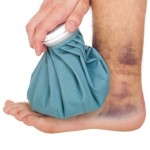Acetaminophen or Ibuprofen?

In most homes you’ll find a bottle of acetaminophen (a.k.a. Tylenol®) sitting next to a bottle of ibuprofen (a.k.a. Advil®, Motrin®). Which one should you reach for when you’re looking to ease your physical discomfort?
While there may be some blurred lines between these two over-the-counter (OTC) medications, there are some factors which may help you to choose one over the other.
First things first, if you are taking other prescribed medications, your physician or your pharmacist would be the best professional to ask regarding any adverse drug interactions with either OTC medication.
Under lying medical conditions may also come into play when making this decision. Acetaminophen is filtered out of the body primarily through your liver, whereas ibuprofen is filtered via your kidneys. If one of those organs is compromised in any way, you would do better to choose the OTC which doesn’t further tax that particular system. Moreover, if you’ve been diagnosed with high blood pressure or a have a history of stomach ulcers, you’d be better off steering clear of ibuprofen, as it’s known to raise blood pressure and it can contribute to stomach lining issues.
Another interesting comparison to be noted is that acetaminophen works only on the brain, to decrease perceived pain. Ibuprofen works on both the brain and the body, specifically reducing inflammation throughout the body. So, a headache might respond better to acetaminophen whereas an inflamed joint or achy muscle would likely respond better to ibuprofen, though both can be beneficial to some degree in any pain scenario.
Finally, a note about controlling high fevers with these OTC meds: They can be used in tandem, administering them on an alternating schedule of every two hours. This is because of the kidney-liver filtrations differences of each, which assures these two organs will not be overtaxed by essentially “double-dosing” on these fever reducing medications—in both adult and children populations.
All the above said, please note, best-practice medical advice is best gained from your own physician (or your child’s pediatrician).